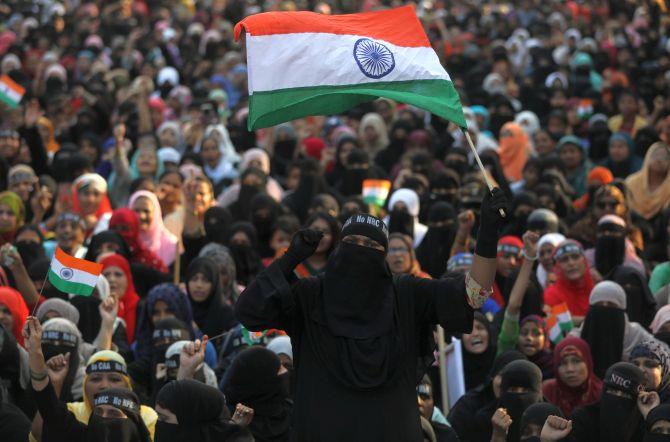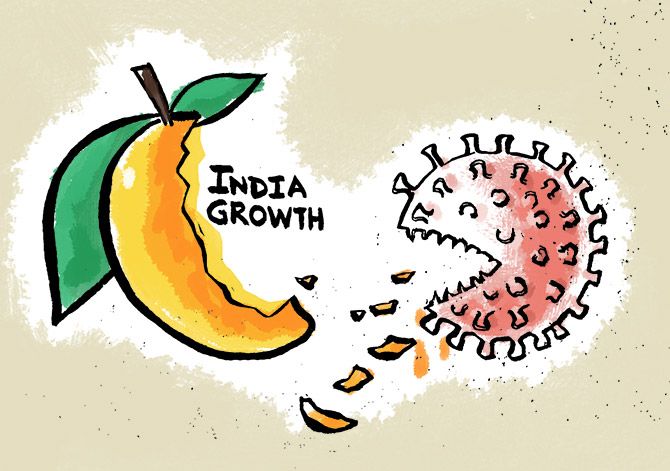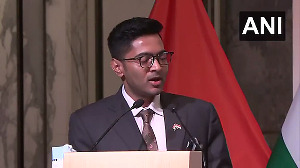'At a time when the economy is depressed, a pandemic is raging, and the Chinese are making noises on the border, the NRC could be resuscitated.'

"Multinationals have been taken aback with the calls for protectionism. Other than agriculture and the government sector, every other sector is in the doldrums. And, on top of this, we do not know how the public health story will play out."
"The curve has not been flattened and migration, air travel, business is all restarting. It is a frightening, daunting, set of circumstances," says Dr Milan Vaishnav, Director and Senior Fellow South Asia Programme at the Carnegie Endowment for Peace, a Washington DC-based think-tank.
The concluding part of his interview with Rediff.com's Archana Masih.
What are some of the biggest economic consequences India will have to bear because of the Covid crisis when the economy was already in a sharp decline before the virus?
I think this is something that is not fully appreciated. India was in the midst of a gradual, multi-year slowdown before this pandemic ever hit.
We lost sight of that because the global economy was struggling, because the BJP won a resounding re-election in 2019 in spite of the economy, and because we've been focused on other issues like CAA, NRC, Ayodhya, Kashmir, Delhi riots, and so on.
We will see several consequences.
We will see private firms doing more with less, just as many did after the 2008 Global Financial Crisis.
We will see states face a massive set of spending cuts as revenues have collapsed across the board.
The Centre will have to pull back on its promises to devolve funds because it will have its own shortfalls to cover (we have already seen this pre-COVID, by the way).
And we are going to see subdued exports for a long time, which is going to keep growth rates subdued.
What do you make of the 20 lakh crore economic revival package announced by the government? How long will it take for the economy to revive?
We are fooling ourselves if we think we can accurately predict the recovery rate. At this point, I've lost all faith in economic projections.
We know, for instance, even projections made by international actors like the IMF are systematically over-optimistic time and time again.
In terms of the economic package, I understand the 20 lakh crore headline has a nice ring to it -- but the fiscal cost is in the vicinity of 1 percent, according to most Indian economists.
I know of no other major economy that includes central bank manoeuvers in the overall calculation of economic relief measures.
They are important, no doubt, but they are a separate kettle of fish.
The size of the package reflects, of course, the fiscal pressures the government faces.
The government may also be holding back somewhat because it wants to reserve some ammunition for the future, given that this recovery will not be swift and India's COVID case load has not yet peaked.
I do think, as a non-economist, there should have been more emphasis on building public health capacity, providing income support, generating demand.
But this also sheds light on an important political economy puzzle facing India. As the journalist Siddharth Singh noted early on, the Modi government has emphasised redistributive policies during normal times and supply-side measures during this crisis. Many would argue that those priorities should have been exactly reversed.
Critics have commented that this package has not been thought through and mixes reforms on one side, rescue on the other and self-reliance as a new strand of fiscal policy. Do you see a lack of coherence in this stimulus?
It's a tired critique of this government to say that it lacks an overarching economic vision. I've written some version of this on multiple occasions, along with so many others.
It may be unoriginal and a cliche; but that does not necessarily make it incorrect. I think the package has been opportunistic -- they've pushed where there is an open window.
But I worry about the self-reliance rhetoric.
Many government ministers have said 'self-reliance' is not code for 'import substitution' or 'protectionism', but I don't know how we can be left with any other impression when the home minister encourages all Indians to spurn imported foreign goods in favour of local ones.

Will this achieve a revival of the economy?
I certainly hope so, but I am sceptical. A lot of the constraints and unfinished business of 2012-2020 are going to come home to roost.
There are a lot of bills to pay and not enough funds in the account to cover them, literally and metaphorically.
Let's not forget the public sector banking crisis is still with us. The NBFC crisis has not gone away.
Trade headwinds and depressed exports will continue to be a reality.
Multinationals have been taken aback with the calls for protectionism. Other than agriculture and the government sector, every other sector is in the doldrums.
And, on top of this, we do not know how the public health story will play out.
As we speak, India has hit 100,000 active COVID cases. The curve has not been flattened and migration, air travel, business is all restarting. It is a frightening, daunting set of circumstances.
What are the political consequences for Mr Modi the longer it takes for the economy to revive?
Modi has thus far excelled in buying himself more time.
From the outset, critics said he had five years to put up or shut up. It was the critics who were forced to shut up in May 2019.
There is still no politician, at the national level, who can go head-to-head, toe-to-tie with Mr Modi -- and that is an immense advantage.
The BJP will likely face setbacks at the state level -- we've seen that over the past three years -- but national politics is a completely different arena right now.
The State Department's Alice Wells commented recently that India can set up supply chains and take away business from China. Several Indian states have amended labour laws anticipating a flow of business from China to India.
Is this a realistic expectation or is it a bubble, given China's entrenched position in the global supply chain?
I asked the former CEA Dr (Arvind) Subramanian this question. He replied by saying so many people were hopeful India would break into global supply chains when businesses first starting moving away from China last decade on account of rising labour costs there.
India missed that boat and it lost out to Vietnam, Bangladesh, and others. Why would this time be different?
One could argue that geo-politics are different, but I'm not convinced firms will be easily swayed by this rationale.
So my take would be: India should definitely do its best to try and exploit this opportunity but it won't be easy. Labour laws are one thing. But infrastructure, electricity, law and order, land, corruption, bureaucracy, protectionism -- these are all inhibiting factors.
I'm reminded of a typically thoughtful Pratap Bhanu Mehta column penned in the wake of India's decision to pull out of the RCEP. At the time, he argued that whether you believe India should have joined or left -- the policy reform agenda you are left with is basically the same.

What are the three political events you see likely to occur in India in the next 12 months?
This is a question I should politely decline to answer, but let me speculate wildly in any case.
First, I would not be surprised if we see another twist in the tale in Bihar. Nitish Kumar is the politician with nine lives -- might we see another political realignment there as he breaks with the BJP or vice versa?
I see no reason why we should rule this out, especially given the BJP's ambitions and its desire to shift the blame for an inadequate COVID response to state capitals.
Second, the pressures of COVID might undo the coalition government in Maharashtra. We know it is, even during the best of times, an uneasy equilibrium.
As Mumbai remains the epi-centre and the caseload grows, the BJP has every incentive to attack the coalition there with hammer-and-tongs.
Third, I expect we will see a return to CAA/NRC before too long.
At a time when the economy is depressed, a pandemic is raging, and the Chinese are making noises on the border, the NRC could be resuscitated as an economic imperative -- to make sure jobs go to deserving Indians, to curb unwanted illegal migration, and to deliver for 'India first'.
Production: Aslam Hunani/Rediff.com










